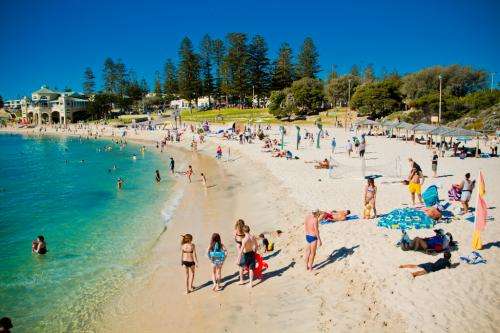Merkel cell carcinoma causes investigated

Local researchers are decoding the secrets to a rare and aggressive form of skin cancer that is prevalent in Western Australia.
PathWest and the University of Western Australia (UWA) are using immunohistochemistry to better understand the biology and causation of Merkel cell carcinoma (MCC).
UWA clinical Associate Professor, Benjamin Wood says West Australians are more likely to develop this deadly skin cancer.
"Western Australia has one of the highest rates of Merkel cell carcinoma in the world," Dr Wood says.
"It's roughly two to three times greater than the rates reported from other places around the world.
"Generally when people think of skin cancer they think of melanoma and non-melanoma skin cancers. Merkel cell carcinoma is one of the non-melanoma skin cancers and it's extremely dangerous.
"The mortality rate of MCC is twice that of invasive melanomas."
However, Dr Wood says MCC still relatively uncommon compared to other types of skin cancers.
Two causes of Merkel cell carcinoma studied
In addition to sun exposure, a virus is important in causing many cases of MCC. In 2008, a previously unknown virus, named Merkel cell polyomavirus (MPyV), was discovered.
"MPyV has been found to be causing this tumour [MCC] in a significant number of patients, but we don't really understand exactly how this viral infection interacts with sun exposure, or what is happening in people who apparently don't have the virus," Dr Wood says.
Ninety-five patients with primary MCC from Western Australia took part in the research between 2011 and 2012, and they were predominately males over 60 years of age.
"We studied samples from each of these patients for immunohistochemical evidence of MPyV and for evidence of chronic sun damage, including changes to the connective tissue and epidermis."
"We found that Merkel cell polyomavirus positivity by immunohistochemistry was much less frequent in the cases occurring on sun-damaged skin when compared with cases on non sun-damaged skin."
"One of the things we know about Merkel cell carcinoma is that a big risk factor to getting it is when the body becomes immunosuppressed," Dr Wood says.
From the research, the researchers found MCC might in fact be two or more different types of tumours.
"MPyV might be less important in a type of MCC which is more frequent in regions with high rates of UV exposure and high rates of MCC, such as Western Australia."
Dr Wood says they are doing further research to look at whether there are other biological differences between MCC in sun-damaged and non sun-damaged skin.
More information: "Merkel cell polyomavirus and p63 status in Merkel cell carcinoma by immunohistochemistry: Merkel cell polyomavirus positivity is inversely correlated with sun damage, but neither is correlated with outcome." Dabner M, McClure RJ, Harvey NT, Budgeon CA, Beer TW, Amanuel B, Wood BA. Pathology. 2014 Apr;46(3):205-10. DOI: 10.1097/PAT.0000000000000069















